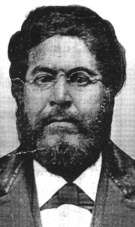George Boyer Vashon
George Boyer Vashon (July 25, 1824 – October 5, 1878) was an American scholar, poet, and abolitionist.
George Boyer Vashon | |
|---|---|
 | |
| Born | July 25, 1824 |
| Died | October 5, 1878 (aged 54) |
| Nationality | American |
| Occupation | Lawyer, teacher |
| Spouse(s) | Susan Paul Vashon |
| Children | Seven |
He was born in Carlisle, Pennsylvania, the third child and only son of an abolitionist, John Bethune Vashon.[1] In 1840, at age 16, he enrolled in Oberlin Collegiate Institute (later Oberlin College), and in 1844 he became its first African-American graduate,[2] and the valedictorian of his class.[3]:106 He was the first practicing African-American lawyer in New York State and was posthumously admitted to the Pennsylvania Bar in 2010,[4] 163 years after being denied the right to practice in the state due to his race, first in 1847 and again in 1868.[1] In 1853, he was a prominent attendee of the radical abolitionist National African American Convention in Rochester, New York. His was one of 5 names attached to the address of the convention to the people of the United States published under the title, The Claims of Our Common Cause, along with Frederick Douglass, James Monroe Whitfield, Henry O. Wagoner, and Amos Noë Freeman.[5] In 1853 he joined the faculty of New York Central College, near Cortland, New York, as a replacement for exiled William G. Allen.[6] In 1857, he married Susan Paul Vashon.[7] In the 1870s he lived and worked for a time in Washington, D.C., where he also taught young African Americans at a night school there.[8]
Vashon High School, in St. Louis, Missouri, is named for Vashon and his son, John Boyer Vashon.
References
- Blue, Christopher T. (June 17, 2008). "George B. Vashon (1824-1878)". BlackPast.org. Retrieved 16 April 2020.
- Baumann, Roland M. (2010). Constructing Black Education at Oberlin College. Ohio University Press. ISBN 978-0821418871.
- "The Earliest Black Graduates of the Nation's Highest-Ranked Liberal Arts Colleges". Journal of Blacks in Higher Education (38): 104–109. Winter 2002–2003. doi:10.2307/3134222. JSTOR 3134222.CS1 maint: date format (link)
- "After 163 Years, African-American Legal Scholar and Abolitionist George B. Vashon to Be Admitted to Pennsylvania Bar". Duane Morris. 13 October 2010. Retrieved 16 April 2016.
- Douglass, Frederick. Frederick Douglass: Selected speeches and writings. Chicago Review Press, 2000. pp. 260–271
- Thornell, Paul N. D. (1998). "The Absent Ones and the Providers: A Biography of the Vashons". Journal of Negro History. 83 (4): 284–301, at p. 294. JSTOR 2649028.
- Gossett, Emma V. (1926). Homespun Heroines and Other Women of Distinction. Xenia, Ohio: Aldine Printing House. p. 133 – via Alexander Street.
- Simmons, William J., and Henry McNeal Turner. Men of Mark: Eminent, Progressive and Rising. GM Rewell & Company, 1887. pp. 474–480
Further reading
- Hanchett, Catherine M. (July 1985). "George Boyer Vashon, 1824–1878. Black Educator, Poet, Fighter for Equal Rights". Western Pennsylvania Historical Magazine. 68 (3). pp. 205+.
- Thornell, Paul N. D. (1998). "The Absent Ones and the Providers: A Biography of the Vashons". Journal of Negro History. 83 (4). pp. 284–301. JSTOR 2649028.
- Gardner, Eric; Nielsen, Aldon Lynn; Leonard, Keith D.; Shockley, Evie; Bynum, Tara (2015). "George Boyer Vashon's 'In the Cars': A Poem and Four Responses". American Periodicals: A Journal of History & Criticism. 25 (2). pp. 177–187. doi:10.1353/amp.2015.0026 – via Project MUSE.